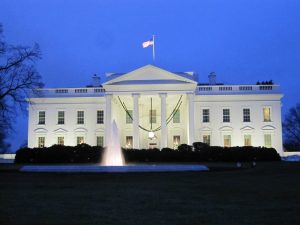Referencing Executive Orders issued by past administrations, on February 24, 2017, President Trump issued a new  Executive Order: “Enforcing the Regulatory Reform Agenda.” The Executive Order establishes new procedures and timelines by which most federal administrative agencies must conduct their regulatory planning and review.
Executive Order: “Enforcing the Regulatory Reform Agenda.” The Executive Order establishes new procedures and timelines by which most federal administrative agencies must conduct their regulatory planning and review.
Articles Posted in Construction Generally
Employers Beware of W-2 Phishing Scams
In Phishing for W-2s: IRS Warns of Expanding Cyber Scam, Pillsbury attorneys Catherine Meyer and Kate Nyce caution all employers to be aware of and protect against cybercriminals scamming employers into turning over their employees’ W-2s.
all employers to be aware of and protect against cybercriminals scamming employers into turning over their employees’ W-2s.
Photo: Blogtrepreneur, Data Breach – Creative Commons
GAO Clarifies Whether An Agency Is Required To Or May Credit An Offeror For Its Subcontractor’s Past Performance
In its recent Atlantic Systems decision, the Government Accountability Office clarified whether an agency is required or simply has discretion to credit past performance references submitted on behalf of an offeror’s proposed subcontractor. The answer: it depends on the type of procurement. For more information, read our Taking Credit for Subcontractor Past Performance GAO clarifies when an agency may decline to evaluate a proposed subcontractor’s past performance references.
Additional Source: Matter of Atlantic Systems Group, Inc., File B-413901; B-413901.2, Decision (Jan. 9, 2017)
“Buy American, Hire American,” What May Be On The Horizon
In “Buy American, Hire American”—From Rhetoric to Regulation, our colleagues Glenn Sweatt, Nancy Fischer, Steve Becker and Matthew Rabinowitz discuss what may be on the horizon for among others, U.S. Government contracts, under the Buy American Act, and other similar protectionist regulations. These laws and regulations require U.S. Government contractors to exclusively use, or give a preference to, U.S. suppliers. Recent statements and Presidential Memorandum from the Trump Administration provide a hint that changes in regulations, exemptions and enforcement may be on the horizon, which will certainly impact U.S. Government construction contracts.
UK Government White Paper Sets Out Principles and Objectives For Exiting the EU
In White Paper Sets Out UK Government’s Brexit Strategy, Pillsbury partners Tim Wright and Sam Pearse discuss the United Kingdom Government’s recent publication of a White Paper titled The United Kingdom’s exit from and new partnership with the European Union that sets out its Principles and Objectives for exiting the EU. Though the White Paper is silent on construction industry generally, even this sector will likely be impacted in a number of ways including through controls on migrant workers as well as new customs arrangements and tariffs – assuming a hard Brexit. Public Procurement laws in the UK are also likely to change; environmental and health and safety laws may also change once the UK leaves the EU.
What to expect in the UK in the company year from recent employment law developments
In Review of UK Employment Law: Key Issues to Monitor in 2017, Pillsbury attorneys discusses a number of
developments in 2016 that will have a significant impact on United Kingdom employment law and looks at what employers in the UK may expect in the coming year.
Photo: Moyan Brenn, UK umbrella in London, Piccadilly Circus, Taken Oct. 12, 2014 – Creative Commons
UK Parliamentary Joint Committee Investigating Ability To Protect Against Human Rights Abuses
Today, Pillsbury partner Tim Wright published his client alert encouraging retailers to be vigilant in preventing human rights abuses in their supply chains whilst complying with their legal obligations. Tim’s alert is in response to the UK’s Parliamentary Joint Committee on Human Rights investigating human rights and businesses to determine whether retailers can ensure that human rights abuses do not occur in their supply chains and is particularly concerned about the use of child labour. Although the joint select committee heard from witnesses from the fashion industry, their work does have a wider remit. The Alert is titled Human Rights and Global Supply Chains.
Congress Initiates Rollbacks of Regulations Promulgated Under Obama Administration
Today, my colleague Sheila McCafferty Harvey and I published our client alert discussing the House Rules Committee meetings this week during which the committee discussed resolutions for
overturning regulations passed under the Obama Administration. The roll-back efforts could include key energy and environmental regulations, including the Bureau of Land Management’s new methane restrictions related to the oil and
gas industry, the Security and Exchange Commission’s requirement for reporting payments to foreign governments, the Department of Interior’s Stream Protection Rule requiring coal companies to restore mining lands back to their original state, and the Department of Energy’s efficiency requirements, among others. Congress may seek to overturn hundreds of agency rules recently promulgated under the Obama Administration. These efforts are being given a high priority. The Alert is titled Congress Begins Congressional Review Act Rollbacks of Energy & Environmental Regulations This Week.
“The old order changeth, yielding place to new,” Executive Orders and Memorandums Directing Environmental and Regulatory Policy
New directions in environmental and regulatory policy are outlined in these Executive Orders and Presidential  Memorandums that have been issued in the past few days:
Memorandums that have been issued in the past few days:
- An Executive Order, dated January 30, 2017, requiring federal executive departments and agencies, whenever they propose to add a new regulation, to delete two existing regulations (Presidential Executive Order on Reducing Regulation and Controlling Regulatory Costs);
- A Memorandum dated January 24, 2017, directing the Secretary of Commerce to develop a plan by which, to the extent possible, all new pipelines or the retrofitting of older pipelines, shall, to the maximum extent, be constructed with pipeline components that are “produced in the United States”, and the Secretary shall provide this plan to the President in 180 days (Presidential Memorandum Regarding Construction of American Pipelines)
- A Memorandum dated January 24, 2017, ordering the relevant government agencies, in particular the Army Corps of Engineers, to expedite the provision of all the authority needed to complete the Dakota Access Pipeline (Presidential Memorandum Regarding Construction of the Dakota Access Pipeline);
- A Memorandum dated January 24, 2017, inviting the owners and operators of the Keystone XL Pipeline to reapply for all necessary permits needed to construct the pipeline and the Secretary of State shall issue a final permitting decision in 60 days (Presidential Memorandum Regarding Construction of the Keystone XL Pipeline);
- A Memorandum dated January 24, 2017 directed to the Heads of Executive Departments and Agencies to support the expansion of domestic manufacturing by streamlining the permitting process and reducing regulatory burdens (Presidential Memorandum Streamlining Permitting and Reducing Regulatory Burdens for Domestic Manufacturing); and
- A Memorandum dated January 24, 2017 instructs departments and agencies, with respect to regulations that have been published in the Federal Register but that have not taken effect, as permitted by applicable law, to A) temporarily postpone their effective date for 60 days for the purpose of reviewing questions of fact, law, and policy they raise, B) where appropriate, to consider proposing for notice and comment a rule to delay the effective date for regulations beyond that 60 day period, and C) in cases where the effective date has been delayed in order to review questions of fact, law, or policy, departments and agencies are to consider potentially proposing further notice-and-comment rulemaking (Memorandum: Implementation of Regulatory Freeze). Exclude from these actions are any regulations “subject to statutory or judicial deadlines.”
The Secretary of Commerce will take the lead in conducting “outreach” to stakeholders concerning the impact of federal regulations and how to streamline the process.
Quote in Title: Alfred, Lord Tennyson
Photo: Dave Newman, Presidential Seal, Taken January 11, 2011 – Creative Commons
“Ban the Box” ~ Are you ready?
Today, our colleagues Stacie Yee and Kimberly Higgins posted their client alert discussing a City of Los Angeles ordinance, effective January 22, barring certain private employers doing business in the city from inquiring about a job applicant’s criminal history until a conditional offer of employment has first been extended. Under the ordinance, covered employers must follow a very demanding procedure before taking an adverse action based on an applicant’s criminal history. The alert is titled “Ban the Box” Has Arrived in the City of Los Angeles—Are You in Compliance?
 Gravel2Gavel Construction & Real Estate Law Blog
Gravel2Gavel Construction & Real Estate Law Blog


